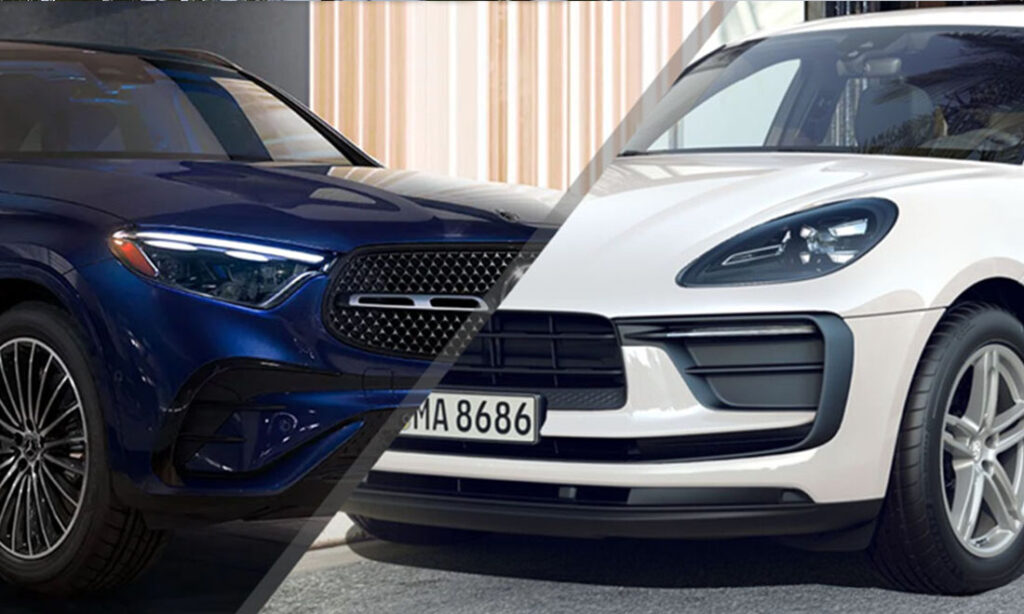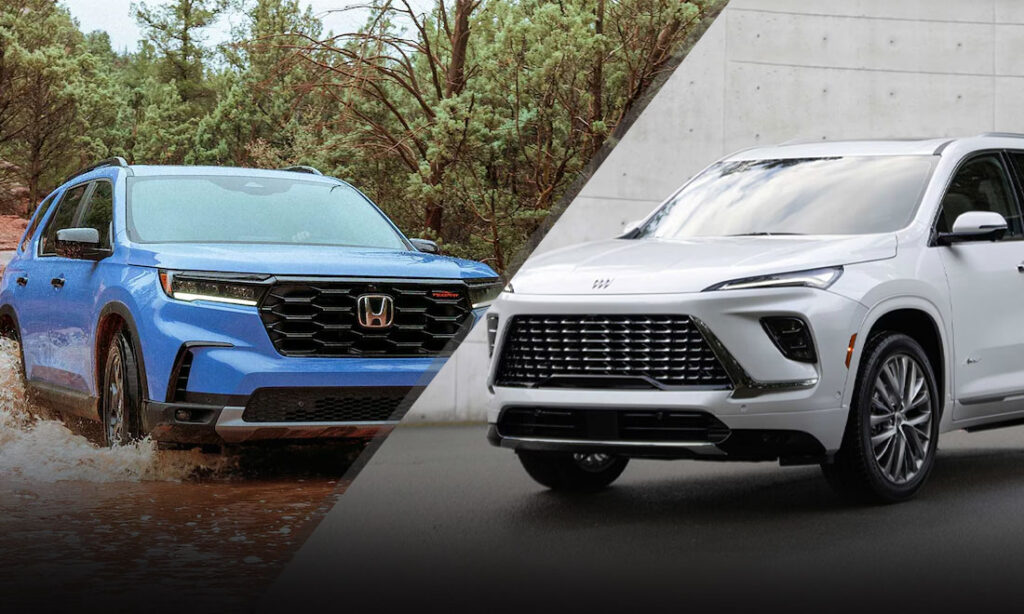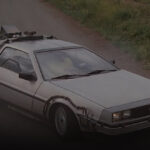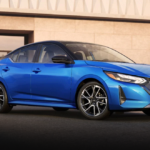Best Official Pace Car Editions
It’s hard to pick the best official pace car editions from over the years. But fear not, we highlight some of the most memorable pace cars from racing history.
Best Official Pace Car Editions
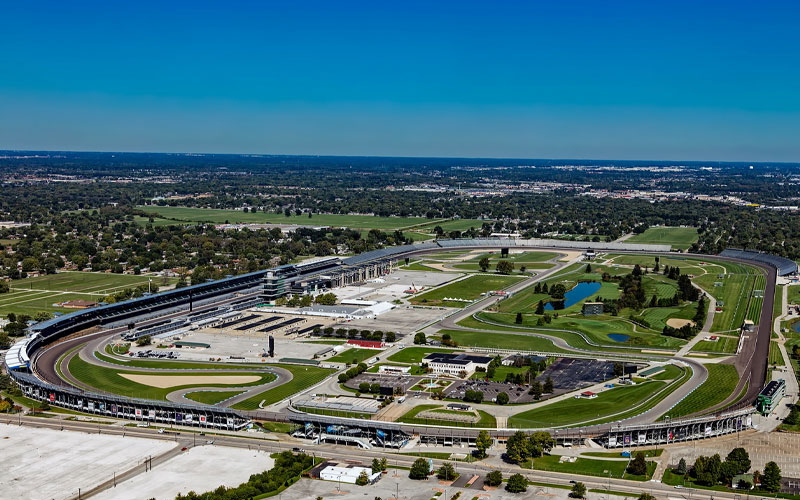
Choosing the best official pace car editions is no easy task given the century-plus history of automakers showcasing the latest and greatest machinery for pace car duty. But before we get to that, a quick primer on how we’re defining the best official pace car editions. Motorsport fans will know that a pace car is the vehicle responsible for keeping competitors at a set speed – the pace – on a racetrack during caution periods.
When it comes to the real-world versions of Days of Thunder or the Indianapolis 500, the pace car also leads the pack for warm-up laps, getting everyone up to speed before the green flag waves and the race officially begins. Going back over 100 years, automakers recognized an opportunity to promote the brand with that pace car in front of enthusiastic fans – and customers.
Over time, car companies released official pace car editions that the public could buy to get in on the action. Here are some of our favorite picks for the best official pace car editions over the years:
1911 Stoddard-Dayton Model 11-A
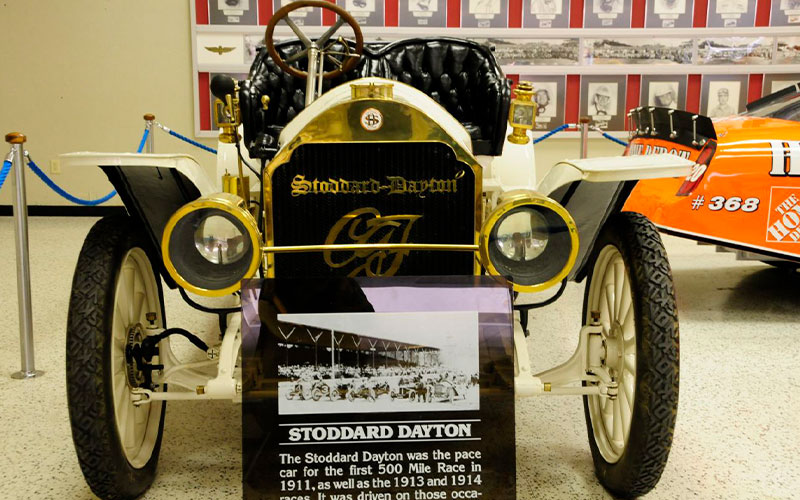
The Indianapolis 500 AKA “The Greatest Spectacle in Racing” has perhaps the most storied history when it comes to official pace car editions, so the very first pace car used in this race is worth remembering. Carl G. Fisher, founder of the speedway, was as much of a car nut as he was a promoter. In the early 1900s, he became a dealer for the now-defunct Stoddard-Dayton brand. Naturally, it was a Stoddard-Dayton that was used as the first Indy 500 pace car, driven by Fisher himself.
1941 Chrysler Newport
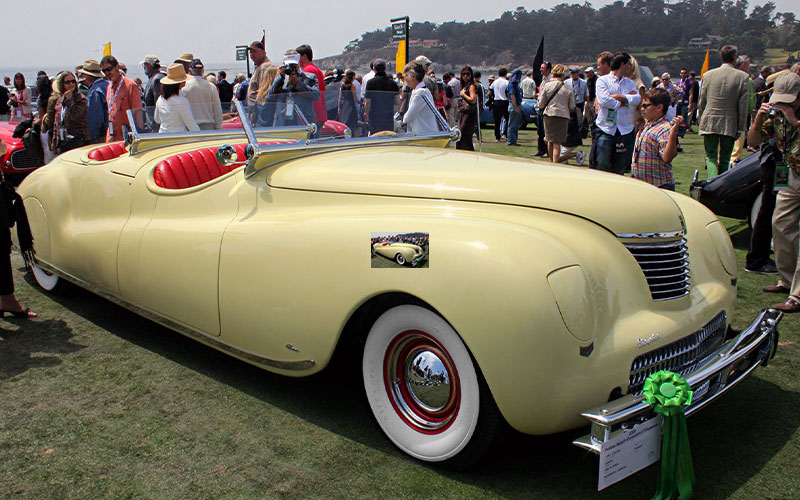
Though Chevy would come to dominate the pace car business at the Indy 500, in the early 40s, a spectacular Chrysler Newport had the reins. Custom built by coachbuilder LeBaron, this particular Newport had a dual cowl setup, impossibly long fenders running front-to-back with CHRYLSER in big block letters, and a retractable hardtop. Powered by a 324 cubic-inch straight-8, Chrysler created six copies of these special Newports.
1953 Ford Sunliner
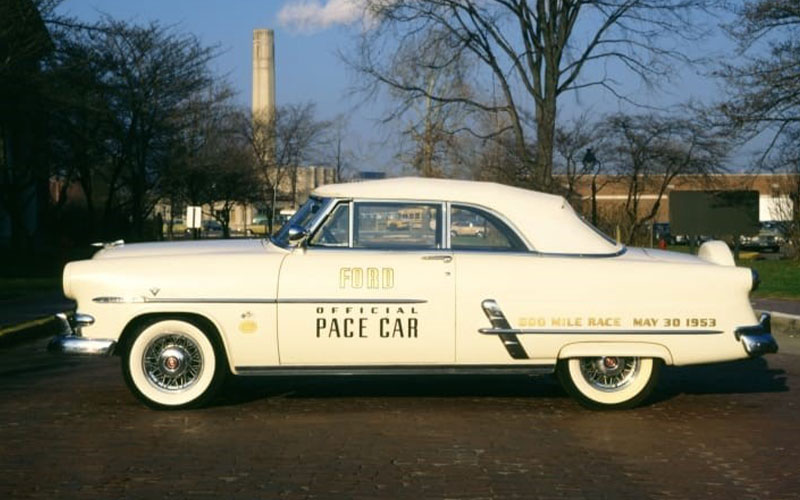
One of the few times that a Ford led the pack at the Indy 500 was with a 1953 Sunliner. Helmed by William Clay Ford, youngest grandson of company founder Henry Ford, this top-spec Crestline model had a 239 cubic-inch V8 under the hood, Sungate Ivory paint, big white walls, and a continental spare tire out back. Ford built 2,000 replicas for purchase by the general public in what is believed to be the first time a manufacturer offered an official pace car edition.
1969 Chevy Camaro SS
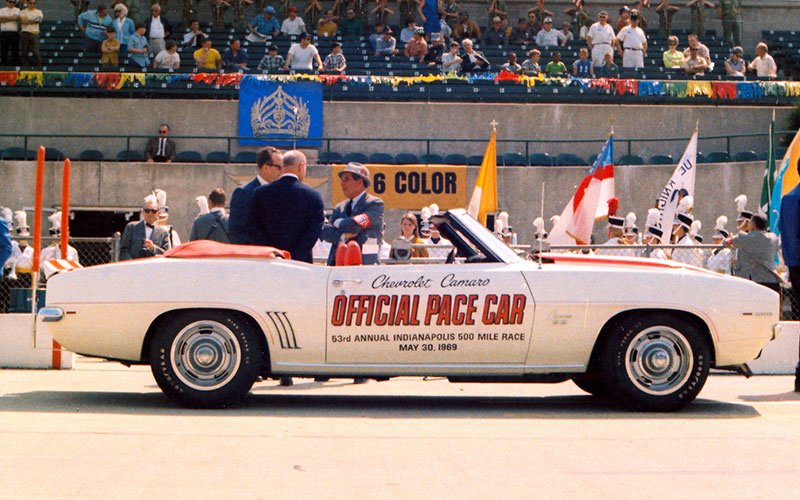
In 1969, the final year of first-gen Camaro production, Chevy built a white droptop pace car in RS/SS configuration. Featuring dual Hugger Orange center stripes and a thumping 396 cubic-inch V8 for track duty, while a larger contingent of “festival cars” were built with 350 V8s. Chevy went on to build some 3,600 official pace car editions for the public to fight over with the same graphics, lettering, and “cowl induction” hood as featured on the real-deal pace cars.
1978 Chevy Corvette
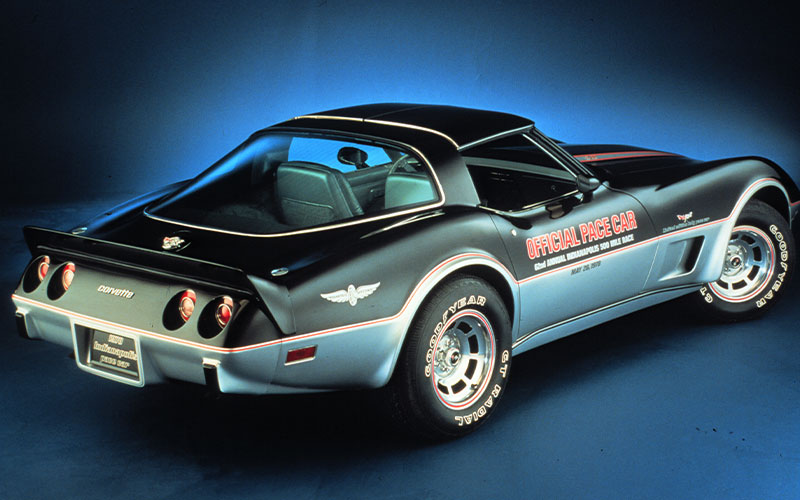
When it comes to Indianapolis 500 pace cars, the Chevy Corvette is hands down the most famous nameplate. That’s because the ‘Vette has paced the Indy 500 a whopping 19 times – so far. It was the 1978 model that kicked off this tradition with an iconic silver-and-black two-tone finish applied to the bulging C3 bodywork. Though GM only planned to make 2,500 replicas for public consumption, it ended up producing 6,502 – one for every Chevy dealership in the country.
1985 Chevy El Camino
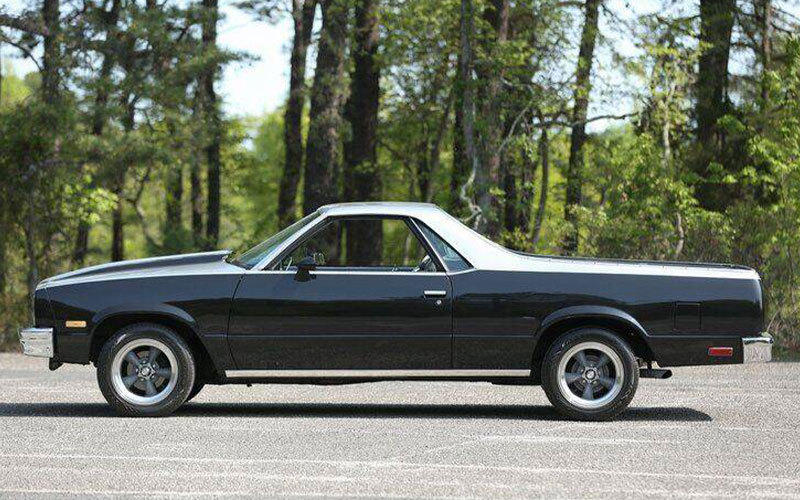
Developed in collaboration with Choo Choo Customs, these red, white, and blue liveried El Camino “IROC-S” variants came with a 350 CID V8, a CB radio, killer alloy wheels, and a light bar either on the roof or a bed-mounted roll bar. Only 15 of these unique pace car editions were built, making them extremely rare today.
Though the Indy 500 dominates the conversation of best official pace car editions, it’s not the only race that automakers have used to promote cool cars. During the 1985 International Race of Champions (IROC) season, an El Camino handled pace car (truck?) duty.
1989 Pontiac Firebird Turbo Trans-Am
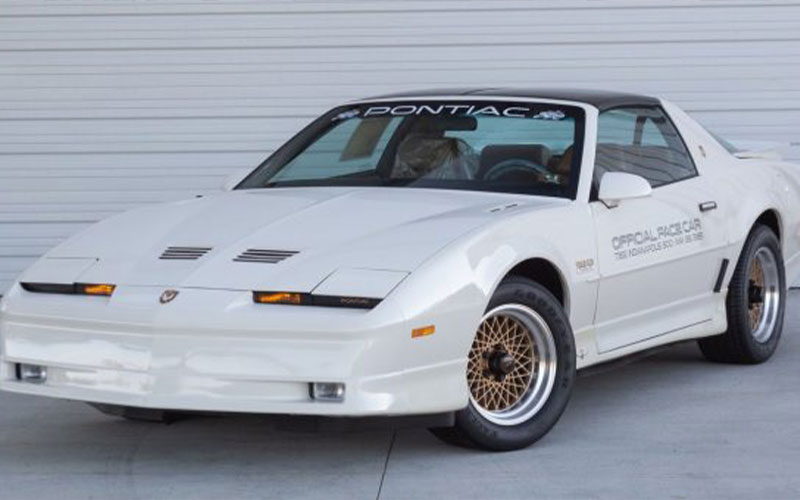
In pace car form, that meant that Pontiac fitted a tuned version of the turbocharged 3.8L V6 from the legendary Buick Grand National program with a surely underrated 250 horsepower. One of the fastest cars of the era, Pontiac built 1,555 official pace car editions for the public to enjoy.
Classic F-body lines, gold basket-weave wheels with polished rims, and a simple white paint job are enough in their own right to make for a sweet ’80s Firebird. But the 1989 model used for Indy 500 pace car duty goes further as it is of the 20th Anniversary Turbo Trans-Am variety.
1990 Chevy Beretta
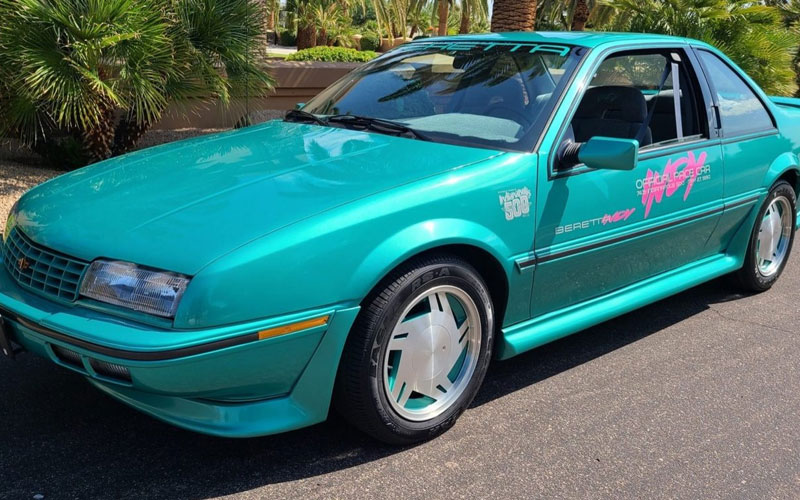
Powered by an underwhelming 3.1L pushrod V6 for the publicly-available editions, these all-the-way-90s cars were offered in yellow or retina-searing turquoise paint jobs. The digital dashboard, color-matched seat stripes and wheel pockets, and pink “INDY” body graphics completed the package.
Now, some might argue that a 1990 Chevy Beretta has no place on the list of the best official pace car editions. But there’s no arguing it’s a memorable model. For track duty, Chevy cut the top off but kept the B-pillar and an associated roof section in place.
1996 Dodge Viper GTS
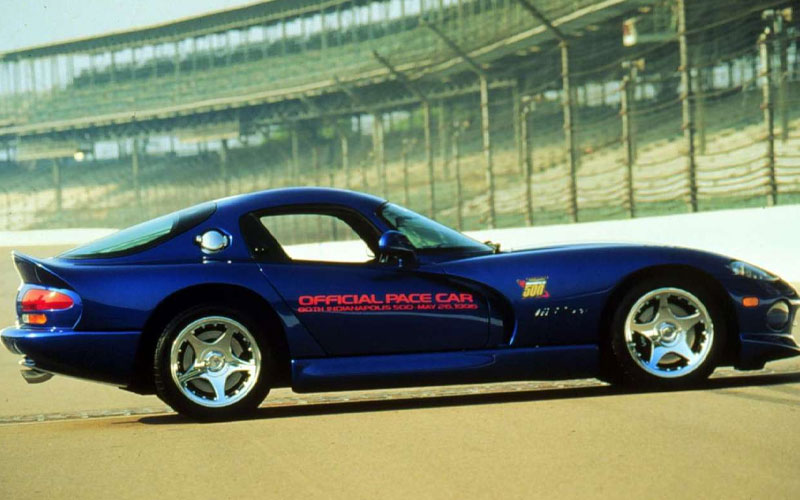
Though not the only Viper to perform pace car duty, the 1996 GTS model that did so for the 80th running of the Indy 500 is an amazing one. Piloted by Bob Lutz, president of Chrysler at the time, these wild machines were finished in Viper Blue with white stripes and simple “OFFICIAL PACE CAR” lettering, a relatively tame style in the annals of pace cars. Better to let the monster 8.0L V10 strapped under the extra-long hood do the talking. There were four produced for speedway use with Dodge applying the same look to a run of limited-edition Ram 1500 trucks.
1998 Chevy Corvette
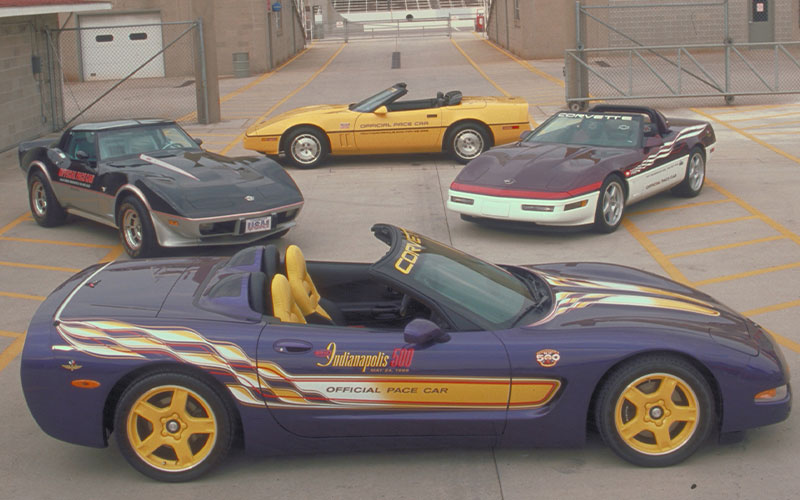
As with the earlier Beretta pace car, Chevy went off the rails with the 1998 Corvette pace car on the design front. Sporting yellow wheels, purplish Radar Blue paint, huge checkered flag body graphics, and a yellow-finished cabin, these C5s are reminders that mistakes were made in the ‘90s. However, that doesn’t diminish the head-turning effect of these models. Chevy made a little over 1,100 official pace car editions making them relatively rare.
2003 Chevy Corvette
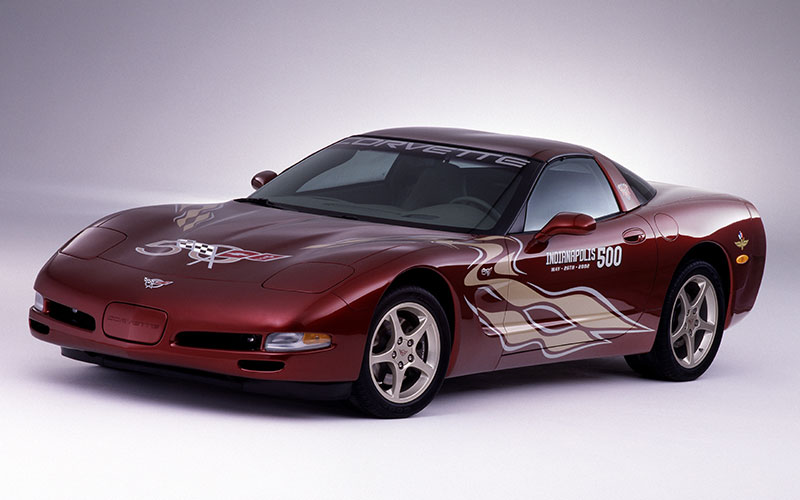
Marking 50 years of Corvette production, this official pace car was finished in deep red with gold flame graphics, a giant 50 hood decal with the Corvette flag logo, and the requisite pace car lettering along the side. Not quite as potent as one of Paul Newman’s preferred race cars, these C5 pace cars were still serious performance cars in their own right.
In 2002, Chevrolet inked a contract to be the exclusive provider of Indy 500 pace cars. Though it has not been a Corvette every year since, that’s not too far off the mark. For 2003, Chevy delivered a far more subdued ‘Vette versus the 1998 wild child.
2008 Pontiac G8
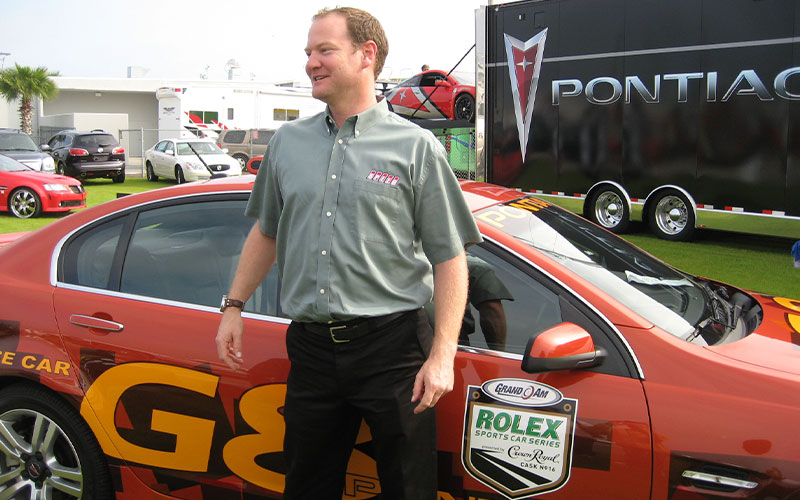
This particular Pontiac G8 sported a 6.0L V8 making 361 horsepower, a custom Corsa exhaust system, a ram-air hood, and high-performance brakes. An unsung sleeper, the Pontiac G8 made for the perfect pace car.
For the 2008 running of the 24 Hours at Daytona, Pontiac showed up with a specially tuned G8 for pace car duty. Finished in Brazen Orange with a custom fiberglass roof, the 2008 G8 was one of the last serious performance cars to be produced by Pontiac before the automaker went the way of the dodo.
2017 Chevy Corvette Grand Sport
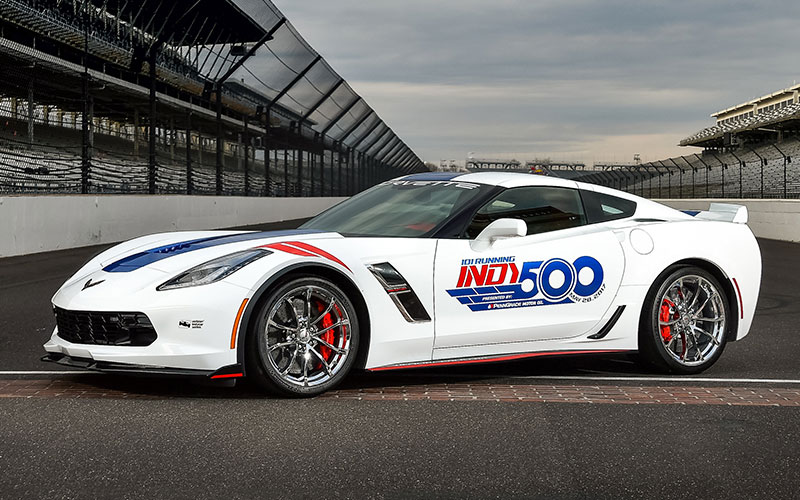
With Dale Earnhardt, Jr. behind the wheel, a 2017 Corvette Grand Sport coupe was the pace car for the 101st Indy 500. Completely stock – as these Corvettes are practically street-legal race cars – this pace car was finished in white with red fender stripes, a wide blue center stripe running front-to-back, and the optional carbon-fiber aerodynamics package. Gloss black on the fender vents and red-trimmed composite side skirts gave these patriotic-themed pace cars a stunning style.
2023 Chevy Corvette Z06
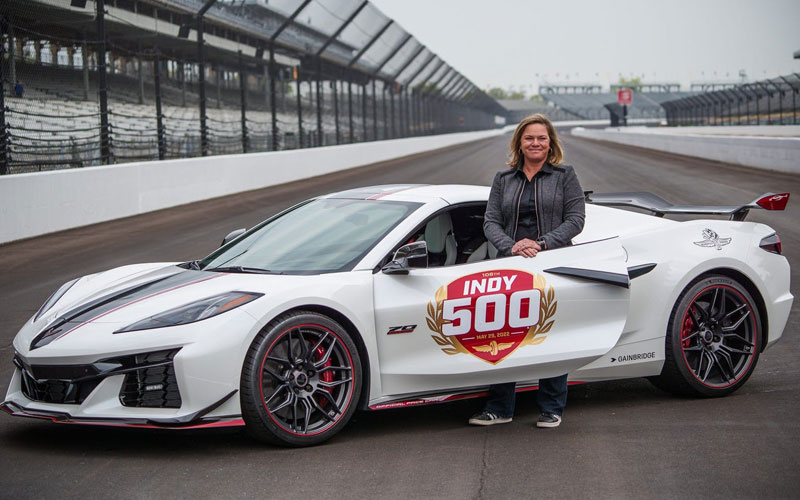
The most recent Corvette put to work as the Indy 500 pace car is from the latest mid-engined C8 generation – in Z06 trim. It’s a looker with a White Pearl Tricoat paint job, blue-and-red center stripe, custom wheels, and a big 70 graphic on the roof panel celebrating the Corvette’s seven decades in production. It’s also a screamer as these Z06 models are powered by a 5.5L V8 with 670 horsepower on tap. Zora Arkus-Duntov, “Father of the Corvette”, would be proud.


